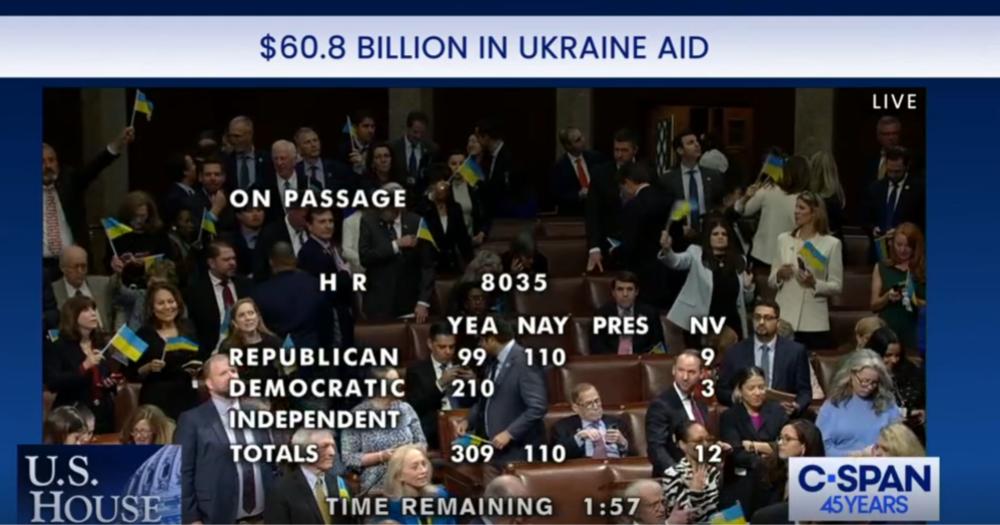The United States House of Representatives approved three bills on Apr. 20, effectively sending over US$95 billion (S$129.3 billion) of mainly military aid to Ukraine, Israel, and Taiwan, amongst others.
Ukraine aid
According to The New York Times, aid to Ukraine had stalled for several months, as members of the Republican party which holds the majority in Congress, have resisted calls to approve new aid to Ukraine.
Ukraine has been resisting an invasion by Russia since February 2022, and has been reliant on significant amounts of U.S. supplied weapons in order to maintain its war effort.
The newly approved bill consists of nearly US$61 billion (S$84 billion) worth of military aid to Ukraine, according to The Guardian.
Of that, US$10 billion (S$13.61 billion) was provided in the form of a repayable loan, which The Guardian attributes to an attempt to appease Republican representatives.
The bill now has to pass the Senate and be approved by incumbent president Joe Biden, although it is not expected to face significant opposition.
It could be fully approved by Tuesday, Apr. 23.
Reaction
Members of the right-wing of the majority Republican party have resisted efforts to send more aid money to Ukraine, often claiming that the money would be better spent dealing with domestic problems, such as immigration.
This faction, while a minority overall, are allied with the popular Republican presidential candidate, Donald Trump, who also opposes more aid to Ukraine.
However, more moderate Republicans, as well as members of the Democratic Party have argued that it is critical to continue providing aid to Ukraine, in order to combat an expansionist Russia.
Until recently, the speaker of the House of Representatives, Mike Johnson, was unable or unwilling to further support efforts to increase aid to Ukraine, likely due to concerns that upsetting the right wing of his party would lead to him being removed from his leadership position, as it did to his predecessor.
However, it appears that he has managed to overcome such concerns, likely due to the fact that aid to Ukraine was nominally tied to aid to other critical U.S. allies, such as Israel and Taiwan.
Reaction to the bill’s passing was celebratory, with several members of the House waving small Ukrainian flags after the vote was passed.
But there was also relief, with Ukraine’s president Volodymyr Zelensky saying: “We appreciate every sign of support for our country and its independence, people, and way of life, which Russia is attempting to bury under the rubble.”
Today, we received the awaited decision on the US aid package that we long fought for. And a very significant one. Our warriors on the front lines, as well as our cities and villages suffering from Russian terror, will feel it.
The U.S. House of Representatives voted on it… pic.twitter.com/G6z3PxsOMg
— Volodymyr Zelenskyy / Володимир Зеленський (@ZelenskyyUa) April 20, 2024
Those who were opposed to the bill, however, called it an act of betrayal, such as Congresswoman Marjorie Taylor Green, who attempted to halt progress of the bill by diverting its funding to a space laser for the U.S.-Mexico border.
HOLY CRAP!
Congresswoman Marjorie Taylor Greene just officially called for US space lasers on the United States / Mexico border.
You literally can’t make this stuff up. We have to be living in a simulated universe created by drunk space cowboys or something.
She wrote an… pic.twitter.com/VLWLEdn5Xd
— Brian Krassenstein (@krassenstein) April 18, 2024
Israel and the Indo-Pacific
Up to US$26 billion (S$35.4 billion) of new military aid was also approved for Israel, despite opposition from some members of the Democratic Party's progressive factions.
Such factions have been calling on Biden to limit or cease aid to Israel, due to the way that Israel had been carrying out its military operation in Gaza.
That military operation, ongoing for nearly six months, has been reduced in intensity in recent weeks, especially as Israel's allies have been trying to convince the country to not attack the border town of Rafah.
But recent events have seen priorities change, as a significant exchange of drone and missile fire between Iran and Israel in the past week has refocused attention on providing military aid for Israel's defence.
The Israel aid bill mainly allows Israel to replenish depleted supplies, as well as money for the Iron Dome and Iron Beam defence systems.
The smallest portion of the new set of military aid goes to Taiwan, with The Guardian reporting that nearly US$8 billion (S$10.9 billion) had been set aside for U.S. allies in the Indo-Pacific region, which included Taiwan.
The aid was passed in the form of three independent bills, with a fourth bill that gave social media platform TikTok’s parent company ByteDance one year to divest itself from the short form video app.
All four bills passed with significant bipartisan support, with the Taiwan bill being the most well-supported, passing by 385 votes to 34.
Related stories
Top image via CSpan

If you like what you read, follow us on Facebook, Instagram, Twitter and Telegram to get the latest updates.



